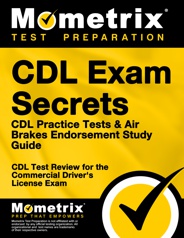If you’re preparing to get your CDL and need help studying for the air brakes section, you’ve come to the right place
Click below to take a free CDL air brakes practice test!
What’s on the Air Brakes Endorsement?
The exam is likely to test your knowledge in several areas involving breaking systems, including parts, dual systems, air brake inspection, and air brake usage.
You can expect to see content areas that include:
- Air brake system parts
- The air compressor, compressor governor, storage tanks, and tank drains
- Alcohol evaporator and the brake pedal
- Foundation brakes that include drums, shoes, linings, wedge and disc brakes
- Pressure issues, including supply pressure and application pressure gauges, and low pressure warnings
- Parking brake controls, like dual parking and modulating control valves
- Anti-local breaking issues
Drivers could also be asked to:
- Show they understand dual air system minimum psi pressure issues to ensure the air brake system is operating properly
- Conduct air brake inspections
- Check the condition and tightness of the air compressor drive belt
- Perform a walk around inspection
- Perform a low-pressure warning signal test
- Make sure the spring brakes automatically come on
- Check the rate of air pressure buildup
- Test the air leak rate
- Check the air compressor governor cut-in and cut-out pressures
- Check the parking and service brakes
- Show a knowledge of braking systems during normal and emergency stops
- Show a knowledge of proper antilock brakes application and braking techniques
- Demonstrate an understanding of the brake lag distance and the total stopping distance
- Demonstrate a knowledge of air brake system components and location
Other questions could include:
- The importance of being in the proper gear before going downhill
- The factors that can lead to fading or failure of breaks
- Factors for parking brake usage
- Techniques for air tank draining
- Slack adjusters, including understanding what they are and how to check them
- Checks to ensure spring brakes automatically deploy
- Understanding supply pressure gauge and spring brakes
Online CDL Prep Course
If you want to be fully prepared, Mometrix offers an online CDL Prep Course. The course is designed to provide you with any and every resource you might want while studying. The CDL Course includes:
- Review Lessons Covering Every Topic
- 950+ CDL Practice Questions
- 500 Digital Flashcards
- Money-back Guarantee
- Free Mobile Access
- and More!
The CDL Prep Course is designed to help any learner get everything they need to prepare for their CDL exam. Click below to check it out!
CDL Air Brakes Endorsement Study Guide
Get practice questions, detailed study lessons, and complex subjects broken down into easily understandable concepts.
 Get Your Study Guide
Get Your Study Guide
FAQs
What is CDL Exam’s Air Brakes Endorsement test?
It’s an exam that tests a driver’s ability to inspect air brakes. Understanding system leaks, warning signals, and emergency breaking are all important. It’s also an important test because anyone who fails may not be eligible to take the road test.
Is there one CDL exam?
Not necessarily. The exam components can differ from state to state. That’s why it’s important to understand the local rules.
Where can I take the exam?
You should consult with your local driver’s license or motor vehicle bureau to see where you can take the exam in your area.
Do I have to take the CDL Exam’s Air Brakes Endorsement exam?
All truckers who drive vehicles with air brakes must take and pass the exam. Truckers who do not pass the test will not be allowed to drive vehicles with air brakes.
What about fees? How do I find out about those?
Again, check with your local bureau. While states generally assess a fee for background checks, there could be additional fees that vary.


 CDL Online Course
CDL Online Course CDL Flashcards
CDL Flashcards
